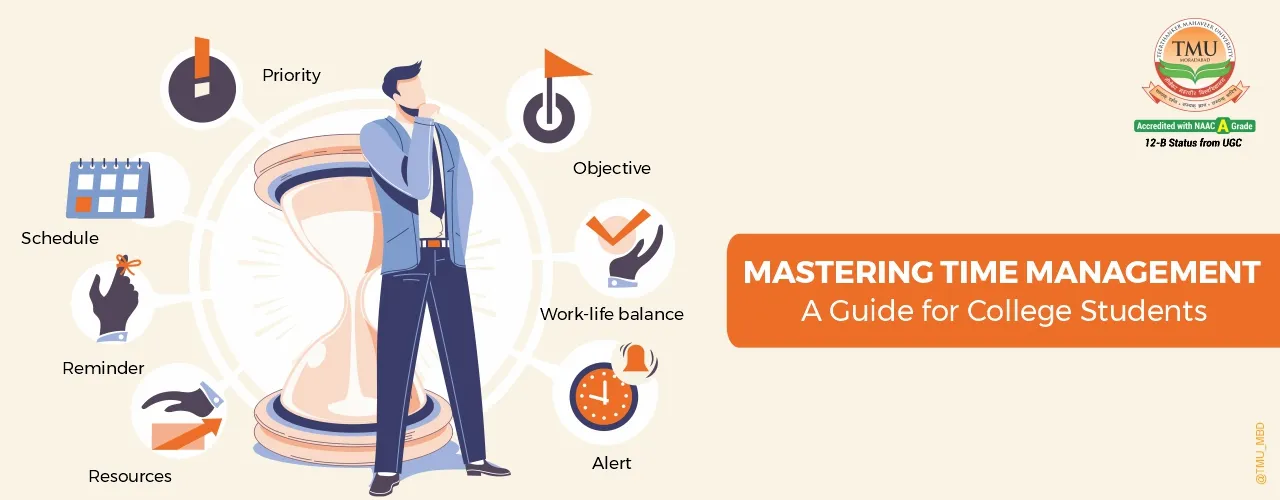Mastering Time Management A Guide for College Students
As a college student, managing time efficiently is crucial to succeeding academically while maintaining a healthy work-life balance. With the abundance of responsibilities and commitments, it's easy to feel overwhelmed. However, by implementing effective time management strategies, you can make the most of your college experience. In this blog post, we will explore practical tips to help you manage your time effectively while attending Teerthanker Mahaveer University, one of the best private universities in India.
Prioritise your tasks:
Start by creating a to-do list or using a planner to jot down all your commitments, including classes, assignments, extracurricular activities, and social engagements. Categorise tasks based on their urgency and importance. By prioritising tasks, you can focus on completing the most critical ones first, ensuring that your time is spent efficiently.
Create a schedule:
Developing a daily or weekly schedule is key to effective time management. Allocate specific time slots for different activities, such as studying, attending classes, working on assignments, and engaging in extracurricular activities. Consider your productivity patterns and designate your most productive hours for tasks that require more concentration. Stick to your schedule as much as possible, but also allow flexibility for unexpected events or spontaneous activities.
Avoid Procrastination:
Procrastination can be a significant obstacle to effective time management. Combat it by breaking down tasks into smaller, manageable chunks and setting deadlines for each subtask. By tackling tasks incrementally, you'll avoid feeling overwhelmed and be more motivated to complete them. Additionally, eliminate distractions during study sessions, such as social media or excessive noise, to maintain focus and avoid wasting time.
Take advantage of campus resources:
When studying at one of the top private universities in the country, you'll have access to various resources to support your academic journey. Make the most of the libraries, research facilities, study groups, and tutors available on campus. Utilising these resources can enhance your learning experience and help you manage your time effectively by streamlining your study process.
Practice effective study techniques:
Adopting effective study techniques can significantly improve your productivity and save you time. Experiment with different methods, such as the Pomodoro Technique (working in focused intervals with short breaks), active reading, summarising key points, or creating flashcards for revision. Find what works best for you and integrate it into your study routine.
Seek work-life balance:
While excelling academically is essential, maintaining a healthy work-life balance is equally important. Allocate time for self-care activities, hobbies, socialising, and relaxation. Taking breaks and engaging in activities you enjoy can reenergize you and enhance your overall productivity. Remember, balance is key to avoiding burnout and maximising your potential as a college student.
Practice effective communication:Communication plays a crucial role in managing time effectively. Build healthy relationships with professors, classmates, and advisors. Clear communication with professors about deadlines or any challenges you may face can help you better manage your time and receive the necessary support. Collaborating with classmates on group projects can also help distribute the workload and save time.
Learn to say no:
While college is a time of exploration and opportunities, it's crucial to learn to say no, when necessary. Recognise your limits and avoid overcommitting yourself. Prioritise activities aligned with your goals and interests, and don't hesitate to decline invitations or commitments that may jeopardise your time management efforts.
Also Read: Choosing a University to learnPractical Skills with Academics.
At TMU, mastering time management is essential for success. By prioritising tasks, creating a schedule, avoiding procrastination, utilising campus resources, practising effective study techniques, maintaining a work-life balance, communicating effectively, and learning to say no, you can optimise your productivity.
For more such blogs, Please visit: TMU Blogs.




Comments (0)